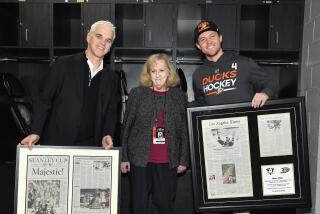FRENCH IMPRESSIONS: Three Times Staff Writers Reflect on Covering Soccer’s Premiere Event
- Share via
PARIS — Sportswriters are not war correspondents. Most of the jabs we dodge are verbal, and the gravest peril we usually face in the course of doing our jobs is being trampled by colleagues when the press dining room opens at a stadium or arena.
But after covering the England-Tunisia World Cup game at Marseille, I was genuinely scared.
Not an “Oh, I’m going to miss deadline,” kind of frightened. More an “I don’t want to die in the middle of the night on a French train that’s being overrun by hooligans,” kind of frightened.
A brief aside.
I was a late addition to the Times’ World Cup team, chosen to replace one of our foreign correspondents, William Montalbano, after his death of a heart attack. Our original plans were based on Montalbano covering Italy, Argentina and the other Spanish-speaking teams; when he died, the assignments were changed to reflect my ability to speak French.
By the time my credential was approved, every hotel within 100 miles of every World Cup stadium was booked. That meant staying in hotels that were so remote they made out-of-the-way places look like palaces. I stayed in rooms with one electrical outlet. With no TV. With doors that flew open at the slightest breeze. Whose sink and toilet backed up in a thunderstorm.
And those were some of the best places.
Which puts me back on the 10:14 p.m. train from Marseille to Nimes.
I thought taking the train back to my hotel in Nimes instead of driving 100 or so miles would let me escape the rowdy English fans whose arrival was much dreaded in Marseille. And one look at the broken glass and rowdy groups outside the Stade Velodrome after the game reinforced that conviction. The bars were due to close at 11, and I hoped to be well out of town by then.
Except the 10:14 didn’t leave until nearly midnight. It sat on the track long enough for the bars to empty and for drunken fans to stumble into the train station.
I sat alone at first. It must have been the fear on my face that inspired a woman sitting nearby to invite me to move beside her. Strength in numbers, or something like that. I wasn’t feeling very strong at that moment, more threatened by the morons who paraded up and down the aisle, sloshing their drinks, yelling racial insults and generally making idiots of themselves.
My new friend was a businesswoman, a frequent traveler. We chatted quietly, hoping to avoid attracting attention from the fools who lurched past us. She gave me some perfume samples and the card of a hotel she knew in Paris. More than that, she gave me courage. She glared at the hooligans, making them more afraid of us than we were of them. They left us alone but for a few bumps.
We were lucky. Our invaders were so drunk they didn’t hurt anyone. But I still don’t understand their anger and hostility, or that of the hooligans who turned the streets of Marseille’s beautiful Old Port area into a battleground. Or the idiots whose beating of a gendarme in Lens left him in a coma. Why a soccer game should spawn such savagery is beyond comprehension.
Most of my memories from this World Cup are blurred. An overambitious schedule put me on too many planes, trains and drives across southern France. I wish I could have turned off the auto route and onto the back roads of Provence or Languedoc. Or stopped at Carcassonne, a medieval walled city that’s visible from the highway between Montpellier and Toulouse. But I had a game to cover, so I saw Carcassonne at a distance, out the car window. It has been there for some 800 years. But I am not sure I will be there again.
As with the two other World Cups I covered, I will remember people more than any single game.
The kindness of my train companion, whose name I never knew. Mingling with Dutch fans outside the Stade Velodrome in Marseille before the Netherlands’ semifinal game against Brazil and getting caught up in their good-natured revelry. The guidance of so many helpful people who drew maps for me when I got lost, which was only every day.
We too often forget it’s the people, not the score, that matter most.
More to Read
Go beyond the scoreboard
Get the latest on L.A.'s teams in the daily Sports Report newsletter.
You may occasionally receive promotional content from the Los Angeles Times.








